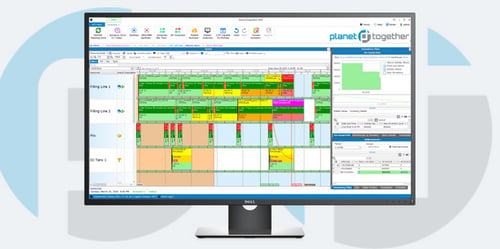Unlocking Growth: How Emerging Markets and New Products Drive Pharmaceutical Manufacturing
The global pharmaceutical manufacturing industry is undergoing a significant transformation, with a projected growth rate of 6.5% CAGR from 2023 to 2030, driven by emerging markets and new product innovations. driven by rising demand from emerging markets and the development of innovative new products. As production schedules grow more complex, production schedulers in pharmaceutical manufacturing facilities must find ways to balance increased demand, product diversification, and regulatory compliance.
Integrating advanced planning and scheduling (APS) systems like PlanetTogether with ERP solutions such as SAP, Oracle, Microsoft, Kinaxis, or Aveva can empower manufacturers to meet these evolving demands efficiently.
In this blog, we'll explore how emerging market demands and product innovation are reshaping pharmaceutical manufacturing, the challenges that schedulers face, and how integrating PlanetTogether with leading ERP systems can help organizations stay competitive.

The Growing Influence of Emerging Markets
Emerging markets, particularly in Asia, Africa, and Latin America, have become major growth drivers for the pharmaceutical industry. Factors contributing to this surge include:
Population Growth: Increasing populations in these regions drive higher demand for essential medications.
Rising Incomes: Economic growth leads to higher disposable income, which supports greater healthcare spending.
Healthcare Infrastructure Development: Government investments in healthcare infrastructure improve access to medicines.
Chronic Disease Prevalence: Non-communicable diseases like diabetes, cardiovascular conditions, and cancer are on the rise, necessitating ongoing pharmaceutical support.
For pharmaceutical manufacturers, this growing demand requires agile production capabilities and efficient scheduling processes to ensure timely delivery to these markets.

Product Innovation as a Growth Catalyst
Innovation remains a cornerstone of growth in the pharmaceutical industry. The rise of biologics, personalized medicine, gene therapies, and vaccines requires flexible and adaptable manufacturing processes. New product introductions often involve:
New Production Lines: Introducing specialized equipment for novel drug formulations.
Stringent Regulatory Requirements: Meeting global standards such as FDA, EMA, and WHO guidelines.
Shorter Time-to-Market: Accelerating product development and launch to maintain competitive advantage.
For production schedulers, managing these innovations while maintaining existing production schedules can be daunting.
Challenges Faced by Production Schedulers
The evolving market landscape introduces several challenges for production schedulers in pharmaceutical manufacturing, including:
Complex Demand Forecasting: Predicting demand in emerging markets can be uncertain, requiring advanced analytics and real-time data integration.
Increased Production Complexity: Managing diverse product lines, including traditional drugs, biologics, and personalized medicines, adds scheduling complexity.
Regulatory Compliance: Pharmaceutical manufacturing is heavily regulated, requiring meticulous documentation and process control.
Supply Chain Disruptions: Global supply chains remain vulnerable to disruptions, impacting raw material availability.
Capacity Management: Ensuring optimal use of production assets while accommodating new product lines is critical.

The Role of Advanced Planning and Scheduling (APS) Systems
Advanced Planning and Scheduling (APS) systems like PlanetTogether provide production schedulers with powerful tools to address these challenges. By integrating PlanetTogether with ERP systems such as SAP, Oracle, Microsoft, Kinaxis, or Aveva, manufacturers can streamline operations, improve visibility, and enhance decision-making.
Key Benefits of APS-ERP Integration
Real-Time Data Synchronization:
Integration ensures that production schedules are automatically updated with the latest demand forecasts, inventory levels, and production statuses.
For example, integrating PlanetTogether with SAP allows schedulers to access live production data, reducing manual data entry and potential errors.
Improved Demand Forecasting:
By connecting with ERP platforms like Oracle, production teams can leverage predictive analytics to forecast demand from emerging markets more accurately.
This helps schedulers adjust production plans proactively, ensuring product availability.
Optimized Production Scheduling:
PlanetTogether's optimization algorithms consider resource constraints, production priorities, and delivery deadlines to create efficient schedules.
Integrating with Kinaxis enhances scenario planning, allowing schedulers to simulate different production strategies.
Enhanced Compliance and Traceability:
Pharmaceutical manufacturers must maintain detailed records to meet regulatory standards.
Integration with Microsoft Dynamics 365 ensures seamless documentation and traceability across production processes.
Agile Response to Market Changes:
The dynamic nature of emerging markets requires manufacturers to adapt quickly to shifting demand patterns.
Integration with Aveva provides enhanced supply chain visibility, enabling rapid adjustments to production schedules.
Best Practices for Production Schedulers
Additionally, staying updated with industry trends is crucial to maintain competitiveness and adapt to evolving market demands.
To maximize the benefits of APS-ERP integration, production schedulers should consider the following best practices:
Invest in Training: Ensure the scheduling team is well-versed in the capabilities of PlanetTogether and integrated ERP systems.
Leverage Predictive Analytics: Use advanced analytics to forecast demand, especially in volatile emerging markets.
Monitor KPIs: Track key performance indicators such as schedule adherence, lead times, and production throughput.
Collaborate Across Departments: Foster collaboration between production, supply chain, and sales teams to align schedules with overall business goals.
Continuously Improve Processes: Regularly review scheduling processes and adapt to new technologies and market dynamics.
The pharmaceutical industry's growth, fueled by emerging market demand and innovative new products, presents both challenges and opportunities for production schedulers. By integrating PlanetTogether with leading ERP systems like SAP, Oracle, Microsoft, Kinaxis, or Aveva, pharmaceutical manufacturers can enhance their scheduling capabilities, improve operational efficiency, and maintain regulatory compliance.
In a competitive and dynamic industry landscape, the ability to adapt quickly to market changes, optimize resources, and deliver high-quality products efficiently will define success. For production schedulers, embracing advanced APS-ERP integration is not just a technological upgrade but a strategic imperative to drive growth and meet the demands of a rapidly evolving global market.
Are you ready to take your manufacturing operations to the next level? Contact us today to learn more about how PlanetTogether can help you achieve your goals and drive success in your industry.
Topics: PlanetTogether Software, Real-Time Data Synchronization, Integrating PlanetTogether, Improved Demand Forecasting, Optimized Production Schedules, Enhanced Compliance and Traceability, Agile Response to Market Changes, Pharmaceutical Manufacturing





















LEAVE A COMMENT